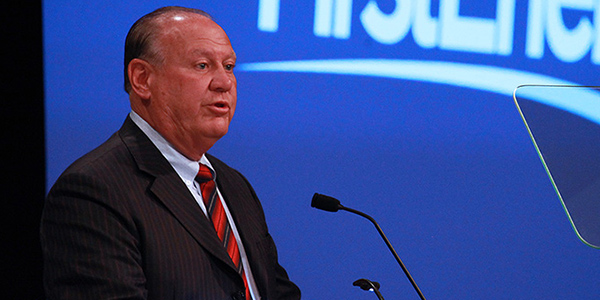FirstEnergy announced late Thursday it had fired CEO Charles Jones and two other officials after an internal investigation determined they had violated the company’s code of conduct in the alleged bribery scheme that resulted in the passage of Ohio House Bill 6.
In July, federal prosecutors alleged FirstEnergy spent $61 million in bribes, “dark money” campaign contributions and advertising to elect the speaker of the Ohio House of Representatives and allies in return for their support of HB6, which provided $1.5 billion in subsidies for the utility’s struggling nuclear plants.
In a press release issued Thursday evening, company officials said the Independent Review Committee of the Board of Directors had announced the termination of Jones, along with two other executives: Dennis Chack, senior vice president of product development, marketing and branding; and Michael Dowling, senior vice president of external affairs.
Officials said an internal review related to “government investigations” determined the executives “violated certain FirstEnergy policies and its code of conduct.”
Jones’ firing was announced after the stock market closed and the guilty pleas earlier in the day of former FirstEnergy Solutions (FES) lobbyist Juan Cespedes, 41, and political strategist Jeff Longstreth, 44, who admitted to participating in a racketeering conspiracy.
FirstEnergy is alleged to have supported the election of former Ohio House Speaker Larry Householder (R) and his associates in a three-year scheme that resulted in the approval of zero-emission credits for FES’ money-losing Perry and Davis-Besse nuclear plants.
Denied Wrongdoing
FirstEnergy no longer owns the nuclear plants, after FES emerged from bankruptcy in February as an independent company, Energy Harbor. But the affidavit that accompanied the criminal charges said that the CEO of “Company A” — as FirstEnergy was referred to in the document — was in regular contact with Householder. (See Feds: FE Paid $61 Million in Bribes to Win Nuke Subsidy.)
Jones, who had led FE since 2015, denied wrongdoing in a second-quarter earnings call, saying, “We let the merits of our arguments carry the day when we’re operating in the political environment.” (See FirstEnergy, AEP CEOs Deny Wrongdoing.)
Steven Strah, president of FirstEnergy, was appointed Thursday as FirstEnergy’s acting CEO. Christopher Pappas, a member of the company’s board, was named executive director.
“We as a board have strong confidence that this leadership transition, and Steve’s appointment as acting CEO, will position FirstEnergy to move forward with positive momentum and drive long-term shareholder value creation,” said Donald Misheff, non-executive chairman of FirstEnergy. “I look forward to working with Chris in his role as executive director to oversee the management team’s execution of FirstEnergy’s strategic initiatives, engage with the company’s external stakeholders and support the development of enhanced controls and governance policies and procedures.”
Strah was appointed FirstEnergy’s president in May as part of the company’s succession planning process, taking over the position from Jones. (See Strah Named New President of FirstEnergy.) Strah, who began his career with The Illuminating Company in 1984, previously served as regional president and vice president of distribution support of Ohio Edison and senior vice president at FirstEnergy Utilities.
“I’m excited for the opportunity to lead FirstEnergy, and I am deeply committed to the future of this company,” Strah said. “I have seen firsthand the strong management team and deep bench of highly capable leaders across our organization, and I am confident in our ability to continue delivering value to our stakeholders as we remain intently focused on our business priorities through this transition and beyond.”
According to a company biography, Jones began his career with Ohio Edison as a substation engineer in 1978 before being named president of Ohio Edison’s Penn Power subsidiary in 1995. Jones would later go on to serve as senior vice president and president of FirstEnergy Utilities in 2010, executive vice president and president in 2014 and to president and CEO in 2015.
Plea Deals
The government said the conspiracy began in March 2017 when Householder began receiving quarterly $250,000 payments through Generation Now, a 501(c)(4) nonprofit organization created to mask the payments.
In his plea Thursday, Longstreth admitted to organizing Generation Now with the knowledge that it would be used to receive bribe money to support Householder’s bid for speaker. Longstreth managed the Generation Now bank accounts and made financial transactions to conceal that FES was a source of funding to Generation Now.
Cespedes pleaded guilty to orchestrating payments to Generation Now with the knowledge that the payments were intended to help Householder and his allies political campaigns in return for passing the nuclear bailout legislation.
Both men face up to 20 years in prison but may be looking for lighter sentences by testifying against Householder and the other two defendants, lobbyist Neil Clark and former Ohio GOP Chairman Matt Borges. U.S. District Judge Timothy S. Black, who accepted the pleas, said he would defer sentencing until the cases against the other defendants are resolved.
“There’s a lot more shoes to drop, and there’s a lot of nervous people today. I don’t know who they are, but they do,” Ohio Democratic Chairman David Pepper told The Columbus Dispatch. “It’s no secret we believe the culture of corruption is absolutely overwhelming in Columbus now. Them turning state witness will lead to more information down the road about how far this plot went.”
“Today’s guilty pleas by Longstreth and Cespedes move the HB6 racketeering scandal from allegation to admitted fact,” tweeted state Attorney General Dave Yost, who is pursuing civil litigation over the scandal. “The only remaining question: ‘Who else?’ My team, including a forensic accountant, is going through the first batch of documents in our civil racketeering lawsuit.”
As of 8 p.m., FirstEnergy’s stock price had dropped by 7.3% to $29.30 in after-hours trading.





